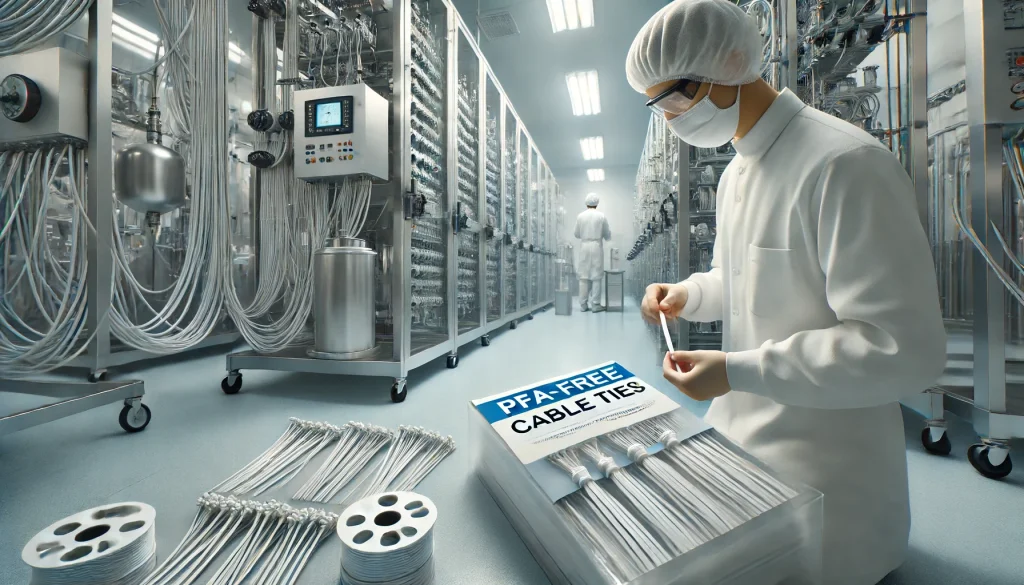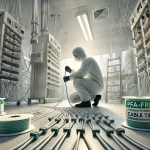Cable ties are essential tools for securing and organizing cables, but concerns about their safety, particularly regarding per and poly-fluoroalkyl substances (PFAS), have been rising. Understanding whether cable ties are PFA-free and what implications this has for their use is crucial for ensuring safety and compliance with health standards.
In this article, we will explore whether cable ties are PFA-free, the significance of PFAS in cable ties and whether you should be concerned. We will also discuss the alternatives available if PFAS-free cable ties are necessary for your specific application.
Understanding PFAS and Their Uses
Industries use per- and polyfluoroalkyl substances (PFAS) due to their resistance to heat, water, and oil. These man-made chemicals are commonly found in products like non-stick cookware, water-repellent fabrics, and some firefighting foams. However, PFAS pose environmental and health risks, leading to increasing scrutiny and regulation.
Known as "forever chemicals," PFAS do not break down easily in the environment or the human body. This persistence raises concerns about their long-term impact on health, including potential links to cancer, hormone disruption, and other health issues.
Are Cable Ties PFA-Free?
Most standard cable ties are made from nylon or other plastic materials and do not inherently contain PFAS. However, some specialized cable ties, particularly those designed for high-performance applications, may include PFAS for added durability and resistance to extreme conditions.
When selecting cable ties, it is important to check the product specifications and manufacturer's information to determine whether PFAS are present. Manufacturers typically disclose this information, especially if the product is marketed as PFAS-free or environmentally friendly.
Should You Be Concerned About PFAS in Cable Ties?
Whether you should be concerned about PFAS in cable ties depends on the specific application and environment in which they are used. Here are some considerations to help you assess the risk and make an informed decision.
Environmental and Health Concerns
Researchers have linked PFAS to various health issues, including cancer, liver damage, and immune system effects. Using cable ties containing PFAS in environments where they might leach into the environment or come into direct contact with food or drinking water poses significant concerns.
In food processing plants, choosing PFAS-free ties helps prevent contamination and ensures compliance with health and safety regulations. Similarly, in environments where ties may be exposed to water sources, opting for PFAS-free options reduces the risk of environmental contamination.
Regulatory Compliance
Regulatory bodies worldwide are increasingly restricting the use of PFAS in various products. Compliance with these regulations is essential to avoid fines and legal issues. Checking the local and international regulations regarding PFAS is crucial, especially if you operate in a highly regulated industry.
In some regions, products containing PFAS must be clearly labelled, and their use may be restricted in certain applications. Staying informed about these regulations ensures that you remain compliant and avoid potential liabilities.
Industry Standards and Requirements
Different industries have varying standards and requirements regarding the use of PFAS. For example, the automotive and aerospace industries may have specific guidelines for materials used in manufacturing. Understanding these standards helps ensure that the ties you choose meet the necessary safety and performance criteria.
Consulting with industry experts or seeking guidance from regulatory bodies can provide clarity on the specific requirements for your application. This ensures that you select ties that meet both safety and performance standards.
Alternatives to PFAS-Containing Ties

If you determine that PFAS-free cable ties are necessary for your application, several alternatives are available. These options provide the same functionality and durability without the associated health and environmental risks.
Nylon Cable Ties
Nylon cable ties are the most common type and are generally PFAS-free. They offer excellent strength, flexibility, and resistance to wear and tear. Nylon ties are suitable for a wide range of applications, from home use to industrial settings.
When selecting nylon ties, ensure that they meet the specific requirements for your application, such as UV resistance or heat resistance. This ensures optimal performance and durability.
Stainless Steel Ties
For applications requiring extra strength and durability, stainless steel ties are an excellent option. They are PFAS-free and resistant to extreme temperatures, chemicals, and UV exposure. Stainless steel ties are ideal for harsh environments and heavy-duty applications.
These ties are commonly used in industries such as automotive, aerospace, and marine, where high performance and reliability are essential. Their resistance to corrosion and chemical exposure makes them suitable for a wide range of demanding applications.
Biodegradable Cable Ties
For environmentally-conscious users, biodegradable ties offer a sustainable alternative. Made from materials that break down over time, these ties reduce environmental impact. While not as durable as nylon or stainless steel ties, they are suitable for temporary or low-stress applications.
Best Practices for Selecting Cable Ties
When selecting the ties, whether PFAS-free or not, following best practices ensures you choose the right product for your needs. Here are some tips to help you make an informed decision.
Assess Your Application
Consider the specific requirements of your application, such as strength, flexibility, and environmental exposure. This helps narrow down the options and ensures you choose ties that meet your needs.
Check Manufacturer Information
Always check the manufacturer's information and product specifications. Look for details on the materials used, including whether the cable ties are PFAS-free. Reputable manufacturers typically provide this information clearly.
Consult Regulatory Guidelines
Consult relevant regulatory guidelines and standards for your industry. Ensure that the ties you select comply with these regulations to avoid legal issues and ensure safety.
Opt for Quality
Choosing high-quality ties from reputable manufacturers ensures durability and reliability. While it may be tempting to opt for cheaper alternatives, investing in quality products can prevent issues and save money in the long run.
Conclusion
Understanding whether these ties are PFA-free and assessing the associated risks is crucial for ensuring safety and compliance. While most standard ties do not contain PFAS, it is important to check product specifications and choose the right type for your application. PFAS-free alternatives like nylon, stainless steel, and biodegradable ties offer safe and effective solutions.
For more insights and tips on ties and other related products, be sure to explore cabletiesunlimited.com and follow us on our social media communities on Facebook and Instagram!
Want to speak with one of our professionals? Reach out at 866-891-0137 and we'll be delighted to help!

